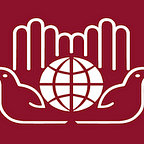IDHA Alumni Spotlight: Fadia Mahdi, Supply Chain Planner ICRC
March 18, New York — Fadia Mahdi still remembers the day the International Committee of the Red Cross (ICRC)headquarters building next to her school was destroyed in an attack. Her school was shut down for three weeks to fix the shattered windows and broken doors. That was when she knew she wanted to become a humanitarian.
Born in Iraq during the 1990 Gulf War, Fadia said she witnessed too many wars and too much violence. “[Our parents] were worried about us going to school every day,” she recalled. “It was very hard to go, not knowing if you will be lucky enough to come home in one piece. As a kid, just like any other kid who grew up in Iraq, I was struggling from poverty and hunger do to the sanctions that were applied on Iraq in the nineties. I was lucky enough to inherit a Barbie doll from my elder sister, and that was an unbelievable dream to the little girls my age. When I become a teenager, it was during the 2003 war on Iraq. The post side effects that we are still struggling with. We didn’t live the normal teenage life. Our parents were not worried about us going out or neglecting our education. On the contrary, they were worried about us going to school every day because of the unlimited amount of explosions happening every single day, not to mention the kidnapping of people, whether if it’s for ransom, selling body organs, vengeance, and worst of all raping girls.”
Fadia went on “to defy all these horrors and make a future” by majoring in computer communication engineering, though she was always more interested in history and psychology. She said, “growing up in Arab countries puts pressure on you regarding the need to make your family proud despite what you are passionate about, and to Arab families, if you don’t major in Medical school, engineering, or law school, then it’s not really something to be proud of, and I was young back then only 18 years old, so I chose to make, my family proud, however, after graduation, I chose my own path, and I chose my own career even though it had nothing to do with engineering.”
After graduation, Fadia began applying for jobs with the ICRC. Because of her lack of experience, it wasn’t easy to get an interview. When she finally did get one, she was accepted right on the spot. Fadia has been working with the ICRC for the last five years and most recently was promoted to the position of Supply Chain Planner for ICRC Iraq.
If she could give advice to her younger self before beginning this career in humanitarian aids, she notes three things:
1. Patience, good results requires patience.
2. Don’t wait for other people to create a healthy and friendly environment at work, you do it yourself.
3. Speak louder and ask more, don’t be afraid of having the wrong the idea or asking the wrong question.
Fadia joined the International Diploma in Humanitarian Assistance program in 2019 because she wanted to “grow more into the humanitarian world.” The only humanitarian work Fadia had ever been exposed to at that point was within her own country, and the vast majority of her experience only came from one place, the ICRC. She wanted to immerse herself in the international sphere of aid work. And it’s a good thing she did; Fadia said the program changed her view on the humanitarian world and revealed a more practical side. “IDHA gives you a thorough picture of the whole humanitarian process,” she said. “To be a good humanitarian, you have to understand the whole picture and how that impacts the people who are waiting for the aid that we are giving them.”
Fadia said the program significantly improved her collaboration skills. The program consists of teamwork meant to imitate real-life humanitarian situations, and she said this taught her to be patient and flexible when working with other people.
One of Fadia’s favorite parts of the program was the connections she made with her peers. She called her graduating class her second family and said that she met one of her best friends in the program. Despite coming from all different walks of life, she said they bonded over their ambition of “wanting change for the greater good.”
“Every one of us came from a different background, and to me, that was the beauty of it,” she explained. “It was very challenging because we all had our own perspective, but by the end of the day…you realize we are all basically the same. We all want to be heard, we all want to have an impact in this life, and we all want to be recognized by who we are and not by our nationality or religion.”
Written by Allison Lecce, IIHA Marketing and Communications Intern
About the IIHA
The Institute of International Humanitarian Affairs (IIHA) prepares current and future aid workers with the knowledge and skills needed to respond effectively in times of humanitarian crisis and disaster. Our courses are borne of an interdisciplinary curriculum that combines academic theory with the practical experience of seasoned humanitarian professionals. The IIHA also publishes on a wide range of humanitarian topics and regularly hosts a number of events in the New York area, including the annual Humanitarian Design for Humanity Summit.
For more information or media inquiries, please contact: Camille Giacovas, Communications & Research Officer, cgiacovas@fordham.edu
